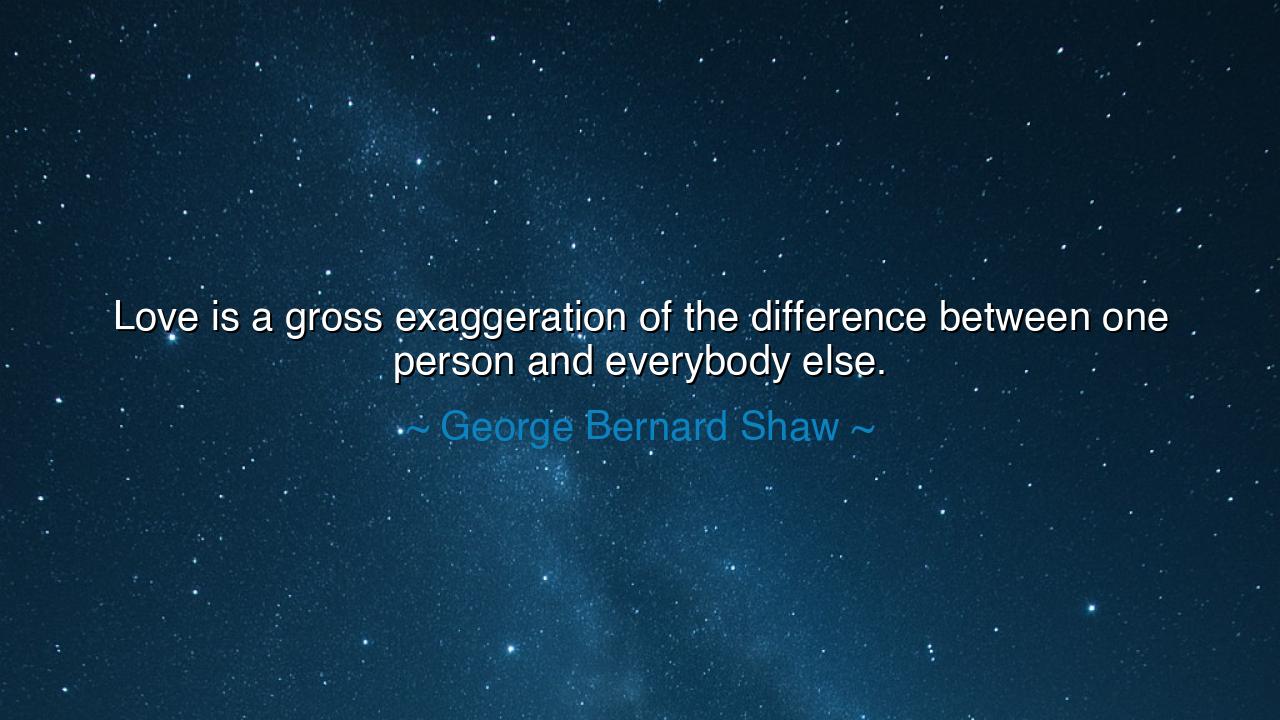
Love is a gross exaggeration of the difference between one person






"Love is a gross exaggeration of the difference between one person and everybody else." These provocative words by the sharp-witted George Bernard Shaw delve into the nature of romantic love, suggesting that love itself is an act of magnification—a distortion of reality where the beloved is elevated above all others in a way that is often irrational, exaggerated, and, at times, illogical. Love, according to Shaw, creates an illusion, one that convinces us that the person we love is unlike anyone else. They become the center of our world, and the differences between them and others are amplified until they seem monumental, even though in reality, they may not be so. This exaggeration, this intensity of perception, is the essence of love’s power and its foolishness.
In the wisdom of the ancients, love was often depicted as a force that could blind as much as it could enlighten. The Greeks, in their exploration of love, described it in many forms: Eros, the passionate and often irrational love, was seen as a force that consumed the lover, sometimes to the point of madness. Plato, in his Symposium, spoke of love as a divine madness, a force that could elevate the soul to greater truths, but one that also led to the exaggeration of human desires. When we love, we are no longer seeing the person before us as they truly are, but through the lens of our desires, our longings, and our hopes. Shaw's quote echoes this truth, that love can make us blind to the ordinary aspects of a person and instead magnify the qualities we most desire to see.
Take, for instance, the story of Cleopatra and Julius Caesar. In their love, Cleopatra saw Caesar not as just a Roman leader but as a man who held the power to change the world. Her love for him magnified his status and made him the central figure in her life, even though he was but one ruler in a vast empire. The power of their bond, and the way Cleopatra elevated Caesar, transformed both of their worlds. In her eyes, he was more than a leader—he was the man who would bring her kingdom to greatness. The way she exaggerated his importance to her, the way she magnified his presence, is a reflection of how love, as Shaw suggests, creates a distortion, a kind of idealization of the beloved, one that elevates them above the rest of humanity. It is this magnification, this exaggeration of qualities, that makes love both wondrous and often dangerous.
Similarly, Napoleon Bonaparte’s love for Josephine offers a striking example of the exaggeration that Shaw speaks of. Napoleon, though a brilliant strategist and emperor, allowed his love for Josephine to shape many of his decisions. His affection for her was so intense, so all-encompassing, that he often overlooked her infidelities and the challenges in their relationship. Josephine, in his eyes, was more than a woman—she was his queen, his anchor in a tumultuous world. His love for her elevated her to a pedestal that was unshakable, even though, in reality, their relationship was fraught with difficulties. The way Napoleon exaggerated her importance in his life illustrates Shaw’s point—love distorts our perception, and in this distortion, the beloved becomes an unreachable ideal, while everyone else falls into the background.
In the lesson embedded in Shaw's words, we are reminded that love, in its purest form, is not about seeing the world as it truly is but about focusing on the difference—the specialness—of one person over all others. This distortion can be both beautiful and perilous. It can make our world seem brighter and more meaningful, but it can also blind us to the imperfections and flaws of the person we love. When we elevate one person above all others, we may forget that they, too, are human, with faults and limitations. This exaggeration of love can lead to disappointment when the reality of a person falls short of the idealization we have created.
The lesson, then, is one of awareness—to understand that while love is a powerful and beautiful force, it is not always objective or balanced. It is natural for us to see the one we love as extraordinary, but we must also remember that love is built on mutual respect, not just on idealization. True love embraces the beloved in their totality, not just the perfection we wish to see. It is a love that accepts both the beauty and the flaws, the grandeur and the imperfection. In relationships, it is essential that we see each other as whole beings, not just through the lens of our desires, but through reality, knowing that love must be tempered with understanding and truth.
In your own life, let love guide you, but do not let it blind you. Love is powerful, but it must be rooted in reality. Recognize when you are elevating someone to a pedestal that may not be sustainable. Love deeply, but also love wisely, with the understanding that those we love are flawed and human, just as we are. Embrace the imperfections, for in them, you will find the true beauty of love—not an idealization, but a connection that embraces the whole person, as they truly are.






AAdministratorAdministrator
Welcome, honored guests. Please leave a comment, we will respond soon